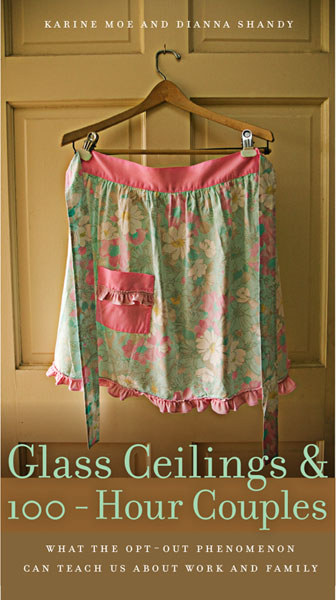Like most women my age (early 30s), I was raised with the belief I could do anything. I did well in school, did well in college, graduated and got a job, and climbed the ladder to upper-middle management (picking up a graduate degree on the way). Then I paused before my fertile years washed away and had a baby.
Eleven months into life with baby I’m still working full-time and don’t have any plans to stop, but I’d be lying if I didn’t say I feel cheated sometimes. My success was supposed to open up options for me, but sometimes I feel like it limits them, because to continue it most likely requires full-time work.
The phenomenon of highly educated, high achieving women quitting their jobs and staying home or changing to more flexible careers is explored in Glass Ceilings & 100-Hour Couples: What the opt-out phenomenon can teach us about work and family by Karine Moe and Dianna Shandy. Through statistics and interviews with mothers, this book gives a glimpse into the lives of those who have opted out, those who continue to work, and those who pursue part-time employment. Every choice is a trade-off, and no “right way” or easy solutions are offered – just real stories by real women.
For anyone who has kids or is thinking of having kids, this book is an invaluable resource. Compared to some of the mothers in the book I feel lucky in some ways — my job has little to no travel, I generally can leave at the end of the day, and we can afford high quality childcare. But it also makes me feel angry that we as a nation haven’t reconciled the dreams we have for our daughters with the inflexibility of workplace culture. It shouldn’t have to be this hard.
Yet I also feel optimistic. If we apply the same intelligence and skills that propelled so many of us into successful careers to the question of how to have a sane, fulfilling work and family life, I feel like we’ll be able to find solutions that work for us. The women in the book certainly have; the successful women turned stay-at-home mother are not resentful and depressed, but happy, and excited to work again when it makes sense for their families.
A few quotes from the book that resonated with me:
“These women were tired of the juggle, the struggle, the complex negotiations with their spouse over who, how, when and where their children were going to be cared for, while simultaneously not dropping the ball at their own jobs.”
“One dimension of the complexity of gender, work, and identity can be seen in our interviews with women who continue to juggle careers and children. Many of those we interviewed in their midthirties to late forties describe being ‘blindsided’ by the realities of juggling career and children. These women were told they could ‘do it all.'”




